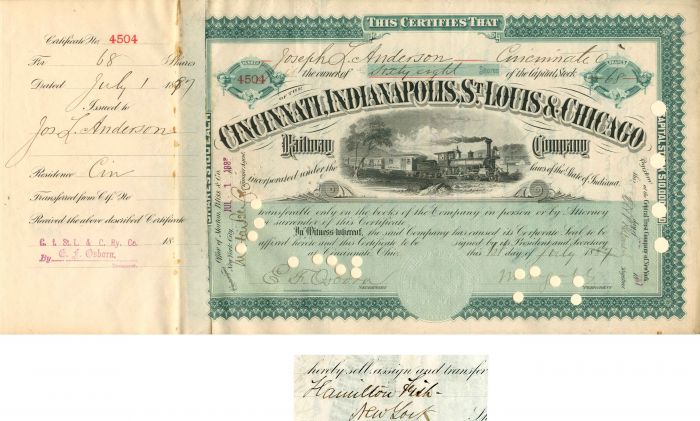Cincinnati, Indianapolis, St. Louis and Chicago Railway Co. transferred to Hamilton Fish - Railroad Stock Certificate
Inv# RS4075B Stock

Stock printed by Franklin Bank Note Co., NY. transferred to Hamilton Fish. Hamilton Fish (August 3, 1808 – September 7, 1893) was an American politician who served as the 16th Governor of New York from 1849 to 1850, a United States Senator from New York from 1851 to 1857 and the 26th United States Secretary of State from 1869 to 1877. Fish is recognized as the "pillar" of the presidency of Ulysses S. Grant and considered one of the best U.S. Secretaries of State by scholars, known for his judiciousness and efforts towards reform and diplomatic moderation. Fish settled the controversial Alabama Claims with Great Britain through his development of the concept of international arbitration.
Fish and Grant kept the United States out of war with Spain over Cuban independence by coolly handling the volatile Virginius Incident. In 1875, Fish initiated the overthrow of the Hawaiian Kingdom that would ultimately lead to Hawaiian statehood, by having negotiated a reciprocal trade treaty for the island nation's sugar production. He also organized a peace conference and treaty in Washington D.C. between South American countries and Spain. Fish worked with James Milton Turner, America's first African American consul, to settle the Liberian-Grebo War in 1876. President Grant said he trusted Fish the most for political advice.
The Cincinnati, Indianapolis, St. Louis and Chicago Railway (CISL&C) was a railroad in the United States. The CISL&C resulted from the 1880 corporate restructuring of the bankrupt Indianapolis, Cincinnati and Lafayette Railroad (IC&L). The CISL&C operated a railroad line from Cincinnati via Indianapolis to Lafayette, being the result of an 1867 merger of the Indianapolis and Cincinnati Railroad (I&C), the Lafayette and Indianapolis Railroad (L&I), and the Cincinnati and Indiana Railroad (C&I). The three predecessor companies had been founded in 1850, 1846, and 1861, respectively.
The CISL&C controlled and operated numerous subsidiary railway companies operating smaller branch lines. These included:
- Cincinnati, Lafayette and Chicago Railroad, which ran from Templeton, Indiana, to Kenkakee, Illinois. Most notably, through service (1872) with the Illinois Central Railroad via Kankakee, Illinois, eventually became the only Amtrak service that utilized Central Station in Chicago. (Amtrak moved to Union Station in 1972)
- Columbus, Hope and Greensburg Railroad from Columbus, Indiana, to Greensburg, Indiana
- Harrison Branch Railroad
In 1889, the railway merged with the Cleveland, Columbus, Cincinnati and Indianapolis Railway and the Indianapolis and St Louis Railway to form the Cleveland, Cincinnati, Chicago and St. Louis Railway, also known collectively as the Big Four. Read more at https://en.wikipedia.org/wiki/Cincinnati,_Indianapolis,_St._Louis_and_Chicago_Railway
A stock certificate is issued by businesses, usually companies. A stock is part of the permanent finance of a business. Normally, they are never repaid, and the investor can recover his/her money only by selling to another investor. Most stocks, or also called shares, earn dividends, at the business's discretion, depending on how well it has traded. A stockholder or shareholder is a part-owner of the business that issued the stock certificates.










Ebay ID: labarre_galleries